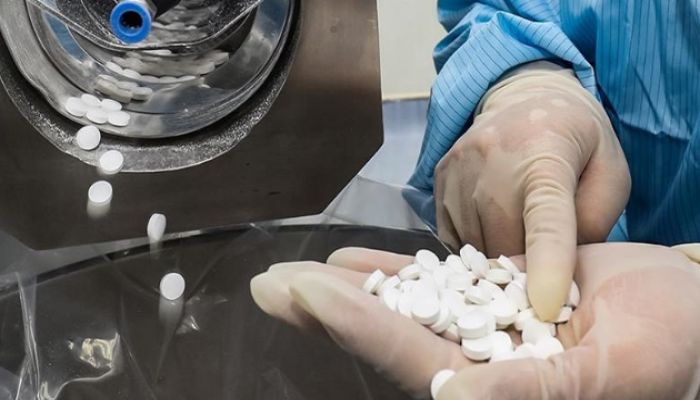
Desk Report
Publish: 22 Apr 2020, 08:34 pm

Coronavirus cure: When will we have a drug to treat it?
More than 150,000 people have died with COVID-19, but there are still no drugs proven to help doctors treat the disease.
So how far are we from these life-saving medicines?
What work is being done to find treatments?
More than 150 specific medicines are being investigated worldwide. Some of them are proven medicines that are being screened against the virus.
The World Health Organisation (WHO) initiated a cooperation trial aimed at identifying the most effective therapies.
The UK says its Recovery trial is the world's biggest, with more than 5,000 patients already taking part
And multiple research centers around the world are attempting to use survivors' blood as a treatment
What types of drugs might work?
There are three broad approaches being investigated:
Antiviral drugs that directly affect the coronavirus's ability to thrive inside the body
Drugs that can calm the immune system - patients become seriously ill when their immune system overreacts and starts causing collateral damage to the body
Antibodies, either from survivors' blood or made in a lab, that can attack the virus
What is the most promising coronavirus drug?
Dr. Bruce Aylward, from the World Health Organization, said remdesivir was the only drug that showed any signs of effectiveness after he visited China.
The antiviral drug was originally designed to treat Ebola, but other options proved more effective.
It has since been shown to be effective at treating other deadly coronaviruses (Middle East respiratory syndrome and severe acute respiratory syndrome) in animal studies, leading to hopes it will also be effective against the COVID-19 coronavirus.
Leaked results from trials led by the University of Chicago also suggested the drug was effective.
It is one of the four drugs in the WHO Solidarity trial and its manufacturer, Gilead, is also organizing trials.
Can HIV drugs treat coronavirus?
There has been much talk, but little evidence, that a pair of HIV drugs - lopinavir and ritonavir - would be effective at treating coronavirus.
There has been some evidence they can work in the laboratory, but studies in people have been disappointing.
The combination did not improve recovery, reduce deaths, or lower levels of the virus in patients with serious COVID-19.
However, as the trial was conducted with extremely sick patients (nearly a quarter died) it may have been too late in the infection for the drugs to work.
Can malaria drugs stop coronavirus?
Malaria drugs are part of both the Solidarity and Recovery trials.
Chloroquine, and a related derivative, hydroxychloroquine, may have antiviral and immune-calming properties.
The drugs have been thrust into the spotlight as potential coronavirus therapies, largely due to claims made by President Trump, but there is still scant evidence on their effectiveness.
Hydroxychloroquine is also used as a treatment for rheumatoid arthritis because it can help regulate the immune system.
Laboratory tests have shown it can inhibit the coronavirus, and there is some anecdotal evidence from doctors saying it appears to help patients.
However, the WHO says there is no definitive evidence of its effectiveness.
What about immune drugs?
If the immune system overreacts to the virus then it can cause inflammation throughout the body. This is helpful for rallying the immune system to fight the infection, but too much can cause collateral damage throughout the body and can be fatal.
The Solidarity trial is investigating interferon beta, which is used to treat multiple sclerosis and lowers inflammation. Interferons are a group of chemicals released by the body when under attack by a virus.
The UK's Recovery Trial is investigating dexamethasone - a type of steroid used to reduce inflammation.
Can survivors' blood treat coronavirus?
People who survive an infection should have antibodies in their blood that can attack the virus.
The idea is you take the blood plasma (the part which contains the antibodies) and give that to a sick patient as a therapy.
The US has already treated 500 patients with what's known as "convalescent plasma", and other countries are getting involved too.
How long until we have a cure?
It is too soon to know when we might have a drug that can treat the coronavirus.
However, we should start to get the results of trials in the next few months. This is much earlier than we will know if a vaccine (which protects against infection rather than treat it) is effective.
This is because doctors are testing drugs that have already been developed and are known to be safe enough to use, whereas vaccines researchers are starting from scratch.
Some completely new, experimental, coronavirus drugs are also being tested in the laboratory but are not yet ready for human tests.
Why do we need treatment?
The most obvious reason for wanting treatment is it will save lives, but it could also allow some lockdown measures to be lifted.
Having an effective treatment would, in essence, make coronavirus a milder disease.
If it stopped people who were admitted to hospital from needing ventilation, then there would be less risk of intensive care units being overwhelmed, so controls on people's lives may not need to be as strict.
So how are doctors treating patients now?
If you are diagnosed with coronavirus, it should be normal for most people and should be handled at home with bed rest, paracetamol, and lots of fluids.
Nonetheless, certain patients require more comprehensive medical care, which includes respiratory assistance, such as breathing.
Source: BBC
Subscribe Shampratik Deshkal Youtube Channel
© 2024 Shampratik Deshkal All Rights Reserved. Design & Developed By Root Soft Bangladesh